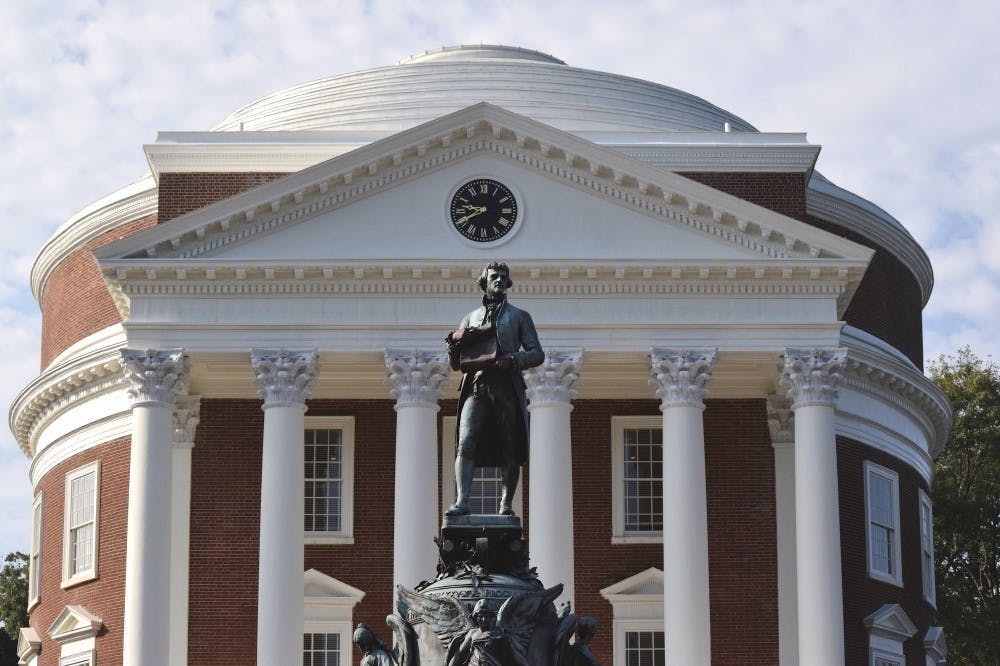中文版请点击此处
The University recently announced multiple initiatives to increase awareness of social situations on Grounds and correct the wrongdoings of its past. It took the exposure of racial unrest in the country and pressure specifically put on by Black students for the University to go past the minuscule amount of reparative actions that they originally saw fit. Administration implemented the Racial Equity Task Force to address these issues — however, even this will not be enough.
The culture of racism can be seen around every corner of the University, both implicitly and explicitly. Because this institution is built on the back of racism and slavery it is not a place where Black students can immediately and fully feel comfortable. There are blatantly racist and microaggressive behaviors aimed at students of color daily. There are gross interactions between police and Black students. In 2019, African Americans only made up around 11 percent of staff — white people made up 74 percent. And only now is the University planning to remove some of its racist monuments — like the George Rogers Clark statue — and rename buildings.
In my orientation group the summer before coming here, we sat and had a frank conversation about the events of Aug. 11 and 12. A white student cried, claiming that she was unaware of the racist events that happened on Grounds and the tolerance that the school had for social injustice. As she cried, I was unable to feel even an ounce of sympathy for her because I knew that she had probably never needed to worry about the gross realities that Black people face daily. I also knew that she is only one of many on Grounds who have this nearsightedness.
Coming to the University, I knew for the most part what I would be getting myself into socially as a young Black woman. I constantly have to deal with the microaggressive behaviors of other students — which many socially aware Black students can tell you they have experienced as well — and find myself in need of more friends who look like me. However, when trying to find people whom I can relate to, I will be labeled as a “self-segregationist.” There is no winning, so I have to make the decision of dealing with the microaggressive behaviors by myself, with no one to talk to about it or to empathize with.
This is a sad trait among many other white students at the University. To outline all the microaggressive behavior I have had to deal with — from people standing next to the empty seat beside me on the bus or being bumped into without any apology — would take all my time. I have found very often there is little to no regard for the person of color among students on Grounds. The University must work actively and fervently to eradicate general racial strain between students.
The University has made an effort to increase courses offering a look into the Black experience and history, but they miss the mark by not hiring more Black professors to teach this curriculum. They also have missed the mark in teaching about the atrocities that took place in the establishment of this institution's history. As a Black student, it is repugnant to listen to white people tell me about the history of my own people, believing and insisting that they are now doing enough for the Black population. Black history taught by a white professor might as well be termed “White History of the Negro.” The subject requires an extra level of understanding and empathy in order to be adequately taught — things a white professor simply does not have in this context.
Thomas Jefferson was a man who did both great and terrible things. And though he founded and envisioned this University, he was a slave owner. The dehumanization of Black people is something that is irrevocable. The literal humanity of the first round of Africans and their descendants following them was stripped away by men like Jefferson. We have seen it many times. We learned the half-truths in primary and secondary school and now we must educate ourselves to find the whole truth.
I found myself called to this University because I knew that someone like me was needed. Not just because I am Black, but because I am noncompliant and generally unsatisfied with tone-deaf efforts. I am no Zyahna Bryant — whose vehemence for social justice is something all young activists should strive for — but the University is in desperate need of more students like her.
I have to be honest — I do not think there is a perfect way to make up for the past. The only way this institution could begin to really make up for its past would be to denounce all of its disreputable beginnings — including our founder’s ideals of life — and taking the time to educate every single student and member of staff on the topic. I would even go as far as to attempt to educate alumni as well. Am I expected to settle for the basics when much more could be done? Memorials mean nothing when change is not being actively and appropriately sought out. Empty gestures mean nothing in a country built on the backs of others.
Aliyah D. White is a Viewpoint Writer for The Cavalier Daily. She can be reached at opinion@cavalierdaily.com.
The opinions expressed in this column are not necessarily those of The Cavalier Daily. Columns represent the views of the authors alone.







